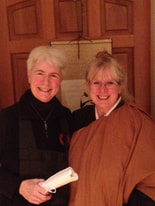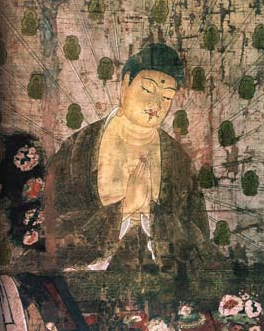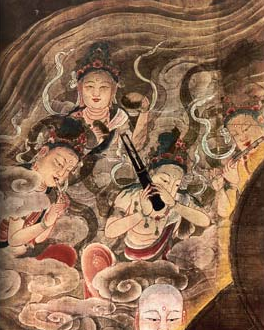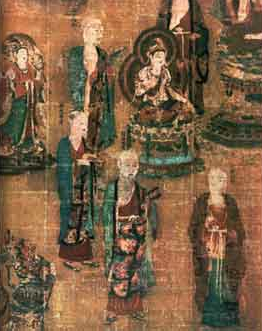Buddhist Women Sharing the Way of the Bodhisattva,
Generation to Generation...
When sangha member Kathleen Duffy wrote The Space Between Us she knew neither Chaplain Katie Egartnor nor Laura, Erica, or Kerry. And she didn’t know that Katie received her chaplaincy ordination from Sensei Tricia Teater.
Yet Kathleen found inspiration from these women and they, too, are totally inspired by her – stitch by stitch.
What a lovely prayer of reciprocal becoming….
Read Kathleen's Duffy piece The Space Between Us here.
Yet Kathleen found inspiration from these women and they, too, are totally inspired by her – stitch by stitch.
What a lovely prayer of reciprocal becoming….
Read Kathleen's Duffy piece The Space Between Us here.
Notes from our chaplains:
Chaplain Katie Egart
Yunyan asked Daowu, “How does the Bodhisattva Kuanyin use those many hands and eyes?”Daowu answered, “It’s like someone in the middle of the night reaching behind her head for a pillow.” Pressed to explain his understanding he said, “All over the body are hands and eyes."
Tools for the bodhisattva
Throughout the past 18 months, Tricia, you have been providing me with pointers to building the ‘toolbox’ for the incarcerated individuals that I work with. As I look back at this journey, it occurs to me that there are objective tools such as chanting, sharing the teachings of the dharma (precepts, paramitas, hindrances), and most of all, meditation. But I can also see that “all over the body are hands and eyes” in that the natural resource that powers the instruments for awakening is the development of good heart, bodhicitta: the heart-mind that trusts the practices, the dharma, and takes refuge in the three jewels.
Spiritual support from a Buddhist perspective can be defined as
• Willingness to bear witness
• Willingness to help others discover their own truth
• Willingness to sit and listen to stories that have meaning and value
• Helping another to face life directly
• Welcoming paradox & ambiguity into care, and trusting that these will emerge into
some degree of awakening
• Creating opportunities for the people to awaken to their True Nature
I like this description* and it validates what you have been providing for me in this mentorship. Your experience and example has given me a way to envision myself in this work for the long term. Having recently celebrated the first Jukai ceremony at the women’s reformatory,I recognize that your guidance was absolutely critical in my persevering against deep reservations that the state religious services had about the formal precept taking. The way that we overcame these obstacles, and more importantly, educated others along the way, is largely due to your deep knowledge, experience and keen guidance every step of the way. Deep bows.
* This description is from buddhistchaplains.org.
Chaplain Shane Pema Tenzin Marcantel
My name is Shane Pema Tenzin Marcantel, Chaplain. After practicing Buddhism for over 11 years, I inquired into the possibility of ordination. By happenstance, I came upon Udumbara Zen Sangha and the teacher that would change my life, Sensei Myoshin Tricia Teater. She asked me "Why ordination?"
How do I put into words all of the pain and suffering I see every day, or this deep need inside to help? As it turns out, when I couldn’t find the words, she filled in the blanks. I was already teaching Anger Management, Lifestyle Redirection, and other classes to other inmates as a Peer Educator. Sensei began the work of offering teachings and watching me run with them. Under her encouragement I began leading services at the prison, and co-founded the interfaith council. Religion seems bent on separation. I, along with a few others, wanted to focus on what we have in common, rather than the things that make us different, and we wanted to learn from each other.
I began sitting with the guys dying in the infirmary, as a hospice volunteer. This wasn't because I chose it, but because there was no one else who would do it. I did the best I could to bring some solace to the dying, if only by sitting silently with them. Staff began to call on me when there was someone on suicide watch. I would go and just sit with them, sometimes listening, sometimes just sitting. Then on December 24, 2017, the greatest teaching came. My beloved mother passed away at 58. Sensei Tricia was there and encouraged and taught me, in ways she couldn’t before...things I needed to go through to understand. Towards the end of the three-and-a-half years of training, Sensei asked me " Do you understand the teachings?". Jokingly, I responded "Yes, I have it all figured out!", to which Sensei laughed. Maybe one day when I have transitioned into a great bodhisattva—maybe then I will have it all figured out!
People asked me why I sought chaplaincy ordination from a Zen Center when I was practicing in the Tibetan Nyingma tradition. Well, I will tell you the same thing that Chris Riebe, the go-between for my Lama H.E. Gochen Tulku Sang-nang Rinpoche and me, said to me: "Pema, the dharma is the dharma! Soak up all the teachings you can! How wonderful that you have this opportunity. Go for it!". While I believe tradition is important, and sacred even, the human species needs dharma now more than ever! I refuse to let sectarianism keep me from reaching out to others, and helping those I can...and Sensei Teater felt the same way.
On December 20, 2018, I received ordination as a Chaplain. While things haven’t always been easy for me, the teachings remain the same. Today I teach a meditation class to over 40 people of different religious persuasions (Islam, Jewish, Wiccan, Moorish, Christian, Buddhist). The class is based on Buddhist principles, and everyone is okay with that. I believe in the transformative power of meditation, and dharma; I am just grateful to be able to do my part. I have earned many vocational certificates and college degrees during my incarceration, but the greatest teaching I have ever received was from Sensei Tricia and Udumbara! Bows....
Chaplain Katie Egart
Yunyan asked Daowu, “How does the Bodhisattva Kuanyin use those many hands and eyes?”Daowu answered, “It’s like someone in the middle of the night reaching behind her head for a pillow.” Pressed to explain his understanding he said, “All over the body are hands and eyes."
Tools for the bodhisattva
Throughout the past 18 months, Tricia, you have been providing me with pointers to building the ‘toolbox’ for the incarcerated individuals that I work with. As I look back at this journey, it occurs to me that there are objective tools such as chanting, sharing the teachings of the dharma (precepts, paramitas, hindrances), and most of all, meditation. But I can also see that “all over the body are hands and eyes” in that the natural resource that powers the instruments for awakening is the development of good heart, bodhicitta: the heart-mind that trusts the practices, the dharma, and takes refuge in the three jewels.
Spiritual support from a Buddhist perspective can be defined as
• Willingness to bear witness
• Willingness to help others discover their own truth
• Willingness to sit and listen to stories that have meaning and value
• Helping another to face life directly
• Welcoming paradox & ambiguity into care, and trusting that these will emerge into
some degree of awakening
• Creating opportunities for the people to awaken to their True Nature
I like this description* and it validates what you have been providing for me in this mentorship. Your experience and example has given me a way to envision myself in this work for the long term. Having recently celebrated the first Jukai ceremony at the women’s reformatory,I recognize that your guidance was absolutely critical in my persevering against deep reservations that the state religious services had about the formal precept taking. The way that we overcame these obstacles, and more importantly, educated others along the way, is largely due to your deep knowledge, experience and keen guidance every step of the way. Deep bows.
* This description is from buddhistchaplains.org.
Chaplain Shane Pema Tenzin Marcantel
My name is Shane Pema Tenzin Marcantel, Chaplain. After practicing Buddhism for over 11 years, I inquired into the possibility of ordination. By happenstance, I came upon Udumbara Zen Sangha and the teacher that would change my life, Sensei Myoshin Tricia Teater. She asked me "Why ordination?"
How do I put into words all of the pain and suffering I see every day, or this deep need inside to help? As it turns out, when I couldn’t find the words, she filled in the blanks. I was already teaching Anger Management, Lifestyle Redirection, and other classes to other inmates as a Peer Educator. Sensei began the work of offering teachings and watching me run with them. Under her encouragement I began leading services at the prison, and co-founded the interfaith council. Religion seems bent on separation. I, along with a few others, wanted to focus on what we have in common, rather than the things that make us different, and we wanted to learn from each other.
I began sitting with the guys dying in the infirmary, as a hospice volunteer. This wasn't because I chose it, but because there was no one else who would do it. I did the best I could to bring some solace to the dying, if only by sitting silently with them. Staff began to call on me when there was someone on suicide watch. I would go and just sit with them, sometimes listening, sometimes just sitting. Then on December 24, 2017, the greatest teaching came. My beloved mother passed away at 58. Sensei Tricia was there and encouraged and taught me, in ways she couldn’t before...things I needed to go through to understand. Towards the end of the three-and-a-half years of training, Sensei asked me " Do you understand the teachings?". Jokingly, I responded "Yes, I have it all figured out!", to which Sensei laughed. Maybe one day when I have transitioned into a great bodhisattva—maybe then I will have it all figured out!
People asked me why I sought chaplaincy ordination from a Zen Center when I was practicing in the Tibetan Nyingma tradition. Well, I will tell you the same thing that Chris Riebe, the go-between for my Lama H.E. Gochen Tulku Sang-nang Rinpoche and me, said to me: "Pema, the dharma is the dharma! Soak up all the teachings you can! How wonderful that you have this opportunity. Go for it!". While I believe tradition is important, and sacred even, the human species needs dharma now more than ever! I refuse to let sectarianism keep me from reaching out to others, and helping those I can...and Sensei Teater felt the same way.
On December 20, 2018, I received ordination as a Chaplain. While things haven’t always been easy for me, the teachings remain the same. Today I teach a meditation class to over 40 people of different religious persuasions (Islam, Jewish, Wiccan, Moorish, Christian, Buddhist). The class is based on Buddhist principles, and everyone is okay with that. I believe in the transformative power of meditation, and dharma; I am just grateful to be able to do my part. I have earned many vocational certificates and college degrees during my incarceration, but the greatest teaching I have ever received was from Sensei Tricia and Udumbara! Bows....
Hospice Work
|
The modern hospice movement began in the 1940's when Dr. Cicely Saunders of England sought to provide a haven where people could die with peace and dignity. She began St. Christopher's Hospital as 'a place of meeting'. Physical and spiritual doing and accepting, giving and receiving, all have to be brought together. The dying need the community, its help and fellowship. The community needs the dying to make it listen. We are all debtors to those who can make us learn such things as to be gentle and to approach others with true attention and respect.
|
Chaplains serve as home visitation volunteers, providing spiritual support to hospice patients and their families. Chief among their activities are listening and being a presence, listening to the feelings expressed by patients as they journey through the final phase of their life and also bearing witness to their life's stories as they do a life review. Other ways of providing assistance include running errands, providing transportation and sometimes doing bereavement work with families. Chaplains participate in memorial services, lead hospice volunteer training workshops and can serve on the Council of Volunteer Advisors.
Prison Work
Chaplains engage in written correspondence with prisoners in various facilities around the country providing support for their Buddhist practice and spiritual counseling during their period of incarceration. They can also provide them with books and other written materials along with meditation supplies. Chaplains continue to offer guidance and assistance to inmates during their transition and beyond following release.
|
Jukai
Lay Ordination
Lay Dharma Teacher Training
Priest Training and Ordination
For more information, call (847) 475-3264
Lay Ordination
Lay Dharma Teacher Training
Priest Training and Ordination
For more information, call (847) 475-3264




